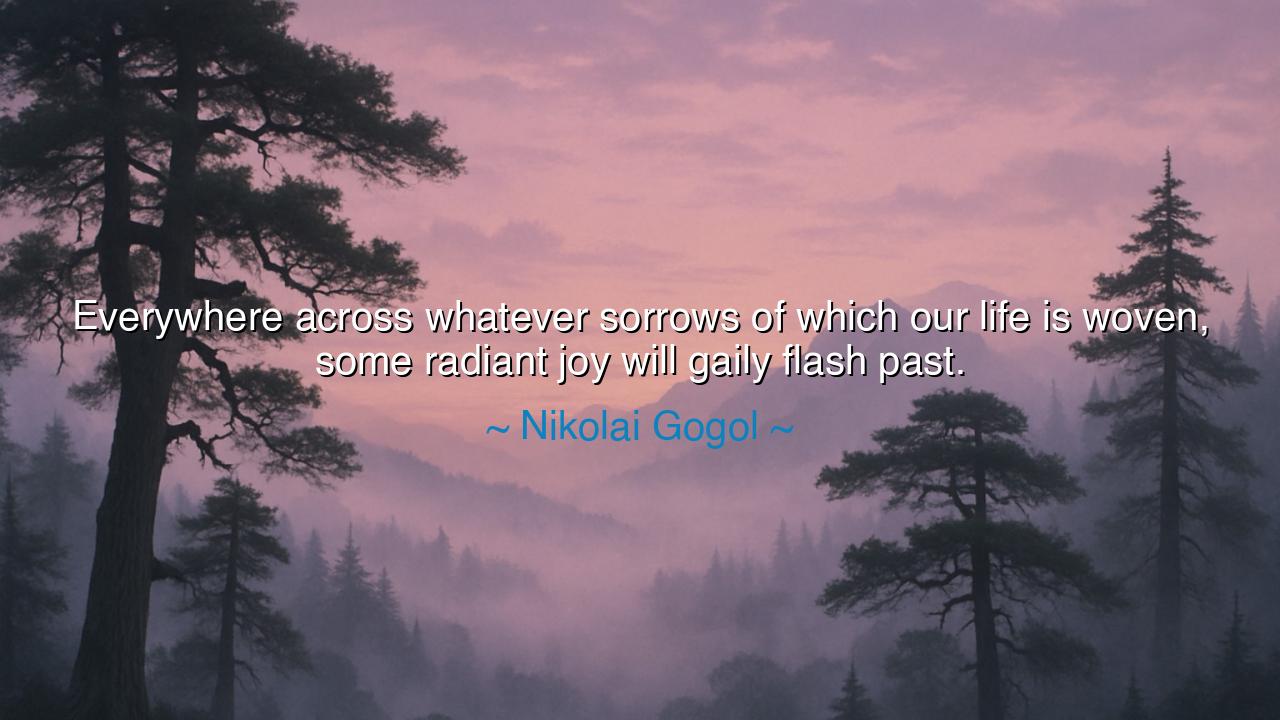
Everywhere across whatever sorrows of which our life is woven
Everywhere across whatever sorrows of which our life is woven, some radiant joy will gaily flash past.






Hear the voice of Nikolai Gogol, the great Russian writer whose tales knew both laughter and despair, who spoke thus: “Everywhere across whatever sorrows of which our life is woven, some radiant joy will gaily flash past.” These words are no idle comfort, but the observation of one who saw the depths of human struggle and yet discovered the sudden spark of light that refuses to be extinguished. For though life is woven with sorrow, it is never without the thread of joy.
The ancients, too, knew this paradox of existence. The Greeks spoke of the goddess Euphrosyne, spirit of gladness, who walked even in the company of her sisters of sorrow. They taught that life is not pure tragedy nor pure delight, but a tapestry of both. Gogol echoes this truth: that amid the hardships and griefs of human existence, there appear moments of such radiance—unexpected, unearned—that they remind us the world is not only shadow, but also light.
Think of the soldier who, weary from battle and covered in dust, suddenly hears the laughter of a child. In that instant, something in him softens, and he remembers what he fights for. Or consider the widow who, in the midst of mourning, recalls a memory of love so tender it brings both tears and a smile. These flashes of radiant joy do not erase suffering, but they pierce it like the sun through clouds, reminding us that despair cannot fully claim the heart.
History offers us luminous examples. During the long years of the Great Depression, when hunger and unemployment darkened millions of lives, families still gathered to share simple meals, neighbors supported one another, and songs were sung that carried laughter through the night. Hardship was real, yet so was joy—brief but powerful, sustaining the human spirit through trials that might otherwise have crushed it. This is Gogol’s wisdom: that even the darkest weave of sorrow has threads of light.
We must understand that such joy is not always grand or overwhelming. It may be small, fleeting, humble—like a bird’s song in winter, a stranger’s kindness, or a memory that resurfaces in the midst of despair. Yet its power is immense, for it reminds the soul that life is not only suffering. These flashes keep us from drowning in grief, anchoring us to the truth that beauty and delight are still possible.
The lesson, O listener, is not to deny sorrow nor pretend it does not exist, but to keep your heart open so that when joy passes by, you may recognize it. Do not let bitterness blind you to those radiant moments. A life spent only in mourning misses the very light that can guide it through the darkness. Joy does not come to erase pain—it comes to help us endure it, to weave color into the tapestry of struggle.
Practical steps are clear: cultivate the eyes to see joy. Each day, even in times of hardship, take note of one moment—however small—that brings warmth to your heart. Cherish laughter, however brief. Give thanks for beauty, however fleeting. In doing so, you train your soul to see what Gogol saw: that no life, however burdened, is devoid of flashes of light.
Thus remember Gogol’s wisdom: life is woven of sorrows, yet joy flashes through it like lightning in the night. Do not despair, for even in the darkest fabric of existence, the thread of joy gleams. Hold fast to it, let it remind you that suffering is not the whole story, and that even amid sorrow, life still dances with light.






AAdministratorAdministrator
Welcome, honored guests. Please leave a comment, we will respond soon